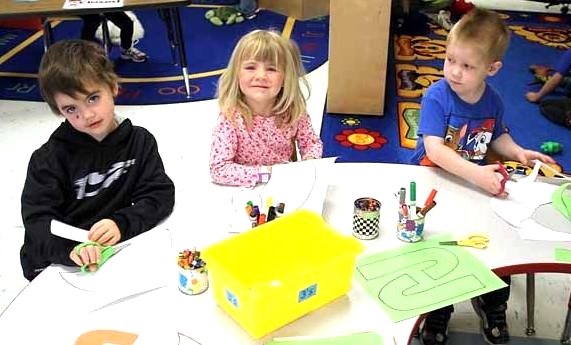A Successful Future Relies on Early Childhood Education

In the journey of life, education is the key that unlocks countless opportunities and paves the way for a bright and successful future. When it comes to education, the foundation laid in early childhood plays a pivotal role in shaping an individual’s path towards excellence. Early childhood education is not just about learning ABCs and 123s; it’s a holistic approach that nurtures cognitive, social, emotional, and physical development. This article delves into the significance of early childhood education in ensuring a promising future for our children.
Read More: How To Make a Career Path Plan
The Importance of Early Childhood Education for a Bright Future
In a world that is constantly evolving, one of the most crucial investments we can make is in the education of our young children. Early childhood education (ECE) holds the key to unlocking a bright and promising future for our next generation. From fostering cognitive development to instilling social skills, the impact of quality early education resonates throughout a child’s life. In this article, we will delve into the multifaceted significance of early childhood education and how it paves the way for a successful and thriving future.
Understanding Early Childhood Education (ECE)
Concept of Early Childhood Education:
At its core, Early Childhood Education refers to the period of learning that takes place from birth to around eight years old. This phase is marked by rapid brain development and a remarkable ability to absorb knowledge and skills.
The Building Blocks of Early Childhood Education
Laying the Cognitive Foundation
In the early years of life, a child’s brain is like a sponge, ready to absorb knowledge and experiences. Early childhood education focuses on fostering essential cognitive skills such as language development, problem-solving abilities, and critical thinking. These skills lay the groundwork for academic success in later years.
Social Skills: Nurturing Future Collaborators
Beyond academics, early childhood education provides ample opportunities for children to interact, share, and collaborate with their peers. Social skills acquired during this period are invaluable in building strong relationships, effective communication, and teamwork – essential qualities for a successful future in any field.
Socialization and Emotional Intelligence
Beyond academics, early childhood education plays a pivotal role in developing social and emotional intelligence. Children learn to interact with peers, resolve conflicts, and express themselves effectively. These skills are vital not only during their school years but also in their personal and professional lives.
The Impact of Emotional Intelligence
Emotional Intelligence is the key to self-mastery. Early childhood education places a significant emphasis on emotional development. Teaching children how to recognize and manage their emotions equips them with a vital life skill. Emotional intelligence paves the way for better mental health, empathy, and resilience – attributes that are crucial for navigating life’s challenges.
Confidence and Creativity: Unleashing Inner Potential
Nurturing creativity and self-confidence is another crucial aspect of early childhood education. Encouraging children to explore their interests, express themselves, and take calculated risks fosters innovation and prepares them for a future where adaptability and out-of-the-box thinking are highly valued.
Physical Development and Well-being
Healthy Bodies, Healthy Minds
Early childhood education promotes physical well-being through activities that encourage active play, exercise, and healthy habits. A strong and healthy body provides the energy and stamina needed to excel academically and pursue one’s passions.
The Role of Parents and Caregivers
Parental Involvement: A Cornerstone of Success
The involvement of parents and caregivers in early childhood education is paramount. A supportive home environment complements formal education and enhances a child’s overall development. Open communication between educators and parents creates a seamless support system that nurtures a child’s growth.
Cognitive Development: Building the Foundation
Early childhood is a critical window for cognitive development. During these formative years, children are like sponges, soaking up information and experiences that shape their understanding of the world. By providing a stimulating and nurturing environment, ECE programs lay the foundation for a child’s future academic achievements.

The Benefits of Early Childhood Education
Long-Term Academic Excellence
Research consistently shows that children who receive a quality early education are more likely to excel academically later in life. The skills and knowledge they acquire during these years create a solid base upon which future learning is built.
Enhanced Critical Thinking
Early childhood education fosters curiosity and a love for learning. This, in turn, nurtures critical thinking skills, enabling children to analyze situations, solve problems, and make informed decisions—a skill set essential for a successful future.
Improved Socioeconomic Outcomes
Investing in ECE can yield significant socioeconomic benefits. Individuals who participate in early education programs are more likely to secure higher-paying jobs, experience lower rates of unemployment, and contribute positively to their communities.
Creating a Supportive Environment
A nurturing home environment complements the efforts of ECE institutions. By providing love, encouragement, and opportunities for exploration, parents and caregivers contribute to well-rounded development.
The Role of Parents and Caregivers
A Collaborative Approach
The importance of early childhood education extends beyond the classroom. Parents and caregivers play a vital role in reinforcing the concepts and skills introduced in formal ECE settings. By actively engaging with their children’s learning, parents can amplify the positive effects of education.
Building a Strong Learning Environment at Home
A child’s home environment serves as their primary classroom. Parents and caregivers can create a conducive learning space that stimulates curiosity, with age-appropriate books, puzzles, and educational toys. This environment fosters a love for learning that extends beyond formal educational settings.
Nurturing Language and Communication Skills
Language development is a cornerstone of early childhood education. Parents and caregivers engage in conversations, read aloud, and introduce vocabulary, laying the groundwork for effective communication skills. This constant interaction cultivates cognitive growth and expands the child’s knowledge base.
Fostering Social and Emotional Development
Parents and caregivers play a pivotal role in teaching empathy, emotional regulation, and interpersonal skills. Through positive interactions and modeling behavior, they help children navigate their emotions, form healthy relationships, and develop a strong sense of self-awareness.
Encouraging Curiosity and Critical Thinking
Young children are naturally curious and inquisitive. Parents and caregivers can harness this curiosity by asking open-ended questions, encouraging exploration, and providing opportunities for hands-on learning. This approach nurtures critical thinking skills that are essential for lifelong learning.
Instilling Good Learning Habits
Early childhood education is not only about what children learn, but also how they learn. Parents and caregivers help establish effective study habits, time management, and organizational skills that set the stage for academic success in later years.
Promoting Motor Skills and Physical Activity
Physical activity is integral to a child’s holistic development. Parents and caregivers facilitate gross and fine motor skill development through play, sports, and creative activities, enhancing coordination and overall physical well-being.
Collaborating with Formal Educational Institutions
Parents and caregivers collaborate with schools and teachers to ensure a seamless educational experience. Regular communication, involvement in school activities, and parent-teacher conferences contribute to a supportive and well-rounded learning journey.
Embracing Cultural and Diversity Awareness
Early childhood education is an opportune time to teach children about different cultures and perspectives. Parents and caregivers expose children to diverse experiences, fostering inclusivity, tolerance, and a global mindset.
Balancing Playtime and Learning
Play is the natural work of childhood. Parents and caregivers strike a balance between structured learning activities and unstructured playtime, allowing children to explore, create, and learn at their own pace.
The Power of Positive Reinforcement
Acknowledgment and praise go a long way in motivating a child’s learning efforts. Parents and caregivers use positive reinforcement to boost a child’s confidence, self-esteem, and enthusiasm for learning.
Setting Realistic Expectations
Each child has a unique learning pace and style. Parents and caregivers set realistic expectations that align with the child’s developmental stage, celebrating individual achievements and milestones.
Overcoming Challenges Together
Early childhood education may come with challenges. Parents and caregivers provide unwavering support, identify learning difficulties, and work collaboratively with educators to find effective solutions.
Read More: About Student Counseling 2023

Challenges and Solutions in Early Childhood Education
Access to Quality Education
While the benefits of early childhood education are undeniable, not all children have equal access to quality programs. Addressing this disparity requires a concerted effort from governments, communities, and educational institutions to ensure that every child has the opportunity to thrive.
Early childhood education lays the foundation for a child’s lifelong learning journey. It is a crucial stage where children develop essential cognitive, social, and emotional skills. However, this phase comes with its set of challenges that educators and parents must address to ensure optimal development. In this article, we will explore some of the key challenges faced in early childhood education and propose effective solutions to overcome them.
Early childhood education is a pivotal phase that shapes a child’s cognitive, emotional, and social growth. However, several challenges hinder the smooth progression of this essential developmental stage.
Insufficient Access to Quality Education
Challenge: Many children, especially in low-income and rural areas, lack access to high-quality early childhood education programs.
Solution: Governments and NGOs should collaborate to establish more early childhood education centers in underserved regions, ensuring that every child has an equal opportunity to learn and thrive.
Lack of Proper Infrastructure and Resources
Challenge: Inadequate infrastructure and a lack of educational materials hinder effective teaching and learning.
Solution: Investment in building and equipping early education centers with appropriate resources, such as books, toys, and learning aids, is crucial to creating an engaging and conducive learning environment.
Addressing Diverse Learning Styles
Challenge: Children have diverse learning styles and paces, making it challenging to cater to individual needs in a classroom setting.
Solution: Trained educators should implement differentiated teaching methods that accommodate various learning styles, ensuring that each child’s unique abilities are nurtured.
Engaging Parents in the Learning Process
Challenge: Many parents are unaware of the significance of early childhood education and their role in supporting it.
Solution: Schools should organize workshops and parent-teacher meetings to educate parents about the importance of their involvement in their child’s learning journey.
Overcoming Language and Communication Barriers
Challenge: Language and communication differences among children from various backgrounds can impede effective instruction.
Solution: Bilingual educators and language support programs can bridge the gap, enabling non-native speakers to grasp concepts effectively.
Ensuring Holistic Development
Challenge: Balancing cognitive, physical, emotional, and social development is essential but often neglected.
Solution: Curriculum planning should focus on a holistic approach, incorporating activities that promote cognitive skills, physical well-being, emotional intelligence, and social interactions.
Training and Supporting Early Childhood Educators
Challenge: Educators need specialized training to understand and address the unique needs of young learners.
Solution: Regular workshops, professional development opportunities, and mentorship programs can enhance educators’ skills and effectiveness in the classroom.
Promoting Health and Nutrition
Challenge: Health and nutrition play a crucial role in a child’s development, but many children lack access to proper healthcare and nutrition.
Solution: Schools should collaborate with healthcare professionals to conduct regular health check-ups and promote healthy eating habits among children.
Fostering Social and Emotional Development
Challenge: Developing social skills and emotional intelligence is as important as academic learning.
Solution: Incorporating activities that encourage teamwork, empathy, and self-expression can promote healthy social and emotional growth.
Incorporating Technology Wisely
Challenge: While technology offers valuable learning tools, its excessive use can hinder real-world interactions.
Solution: Educators should strike a balance by integrating technology into lessons in a purposeful manner while prioritizing hands-on experiences.
Assessment and Evaluation Methods
Challenge: Assessing the progress of young children through traditional methods can be challenging.
Solution: Educators should use a combination of observation-based assessments, portfolios, and narrative evaluations to gauge a child’s development accurately.
Financial Constraints in Early Education
Challenge: Insufficient funding often limits the implementation of effective teaching methods and resources.
Solution: Governments and policymakers should prioritize early childhood education funding to ensure equal access to quality education for all children.
Community Involvement and Support
Challenge: Limited community engagement can hinder the overall development of early childhood education.
Solution: Establishing partnerships with local communities, businesses, and organizations can create a supportive network that enhances the quality of early education programs.
Conclusion
Early childhood education is the bedrock upon which a bright future is built. It goes beyond academics, shaping children into well-rounded individuals with strong cognitive abilities, emotional intelligence, and physical well-being. By investing in early childhood education, we invest in a future where our children are equipped to overcome challenges, make meaningful contributions to society, and lead fulfilling lives.
Early childhood education is a critical phase that sets the stage for a child’s future learning and growth. By recognizing and addressing these challenges, we can create a nurturing environment where every child has the opportunity to develop their full potential.
Early childhood education is a cornerstone of a bright and successful future. Its impact reaches far beyond the preschool years, influencing a child’s cognitive abilities, social skills, and overall development. By investing in quality early education and fostering a collaborative learning environment, we empower our children to become lifelong learners, critical thinkers, and contributing members of society.
Frequently Asked Questions
What is the ideal age for a child to start early childhood education?
Early childhood education can begin as early as infancy through programs that focus on sensory stimulation and early interactions.
How does early childhood education prepare children for future academic challenges?
Early childhood education equips children with essential foundational skills, such as language development and cognitive abilities that are crucial for later academic pursuits.
Are there benefits of early childhood education for children with special needs?
Yes, early childhood education can be tailored to accommodate children with special needs, providing them with tailored support and opportunities for growth.
What role do parents play in early childhood education?
Parents play a critical role in reinforcing the lessons learned in early childhood education settings and creating a supportive learning environment at home.
How can communities promote access to quality early childhood education for all children?
Communities can advocate for increased funding, establish partnerships with educational institutions, and raise awareness about the importance of early childhood education.
Early childhood education is a crucial phase in a child’s development, setting the foundation for their future learning and success. While formal education institutions like preschools and kindergartens play a significant role, parents and caregivers have an equally important part to play in shaping a child’s educational journey. This article delves into the multifaceted role parents and caregivers play in early childhood education, highlighting their impact on cognitive, social, emotional, and physical development.












3 Comments